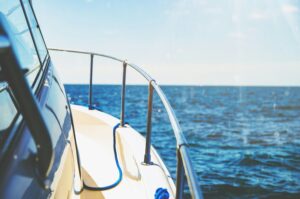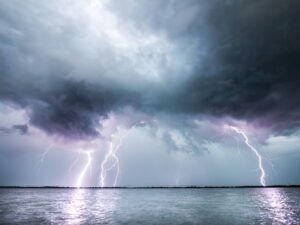
We can’t think of a better pastime than breathing in the fresh outdoor air while riding the waves in your watercraft. However, as with any outdoor activity, there can be risks involved. Having the right insurance coverage can give you peace of mind and protect you from financial loss in the event of an accident or incident. In this blog post, we’ll take a look at common boat insurance claims and provide some advice on what you can do to prevent them.
Hitting an Object in the Water
One of the most common boating insurance claims is damage caused by hitting floating or submerged objects in the water. These objects can include logs, rocks, and other debris and can especially be a problem in low-visibility conditions and shallow water. While running into these objects can lead to minor scars on your watercraft, it can also cause mechanical failure, damage to the hull and propellers, or even sinking.
Even the most experienced boaters may run into this issue because floating or submerged rocks and logs can be challenging to locate. To prevent hitting these the next time you set sail, ensure you do the following:
- Do your research before heading out: Research or ask around to find out if any known areas on the lake or body of water have lots of debris or objects. This way, you can stay clear of these spots.
- Go boating with another person: Sometimes, catching everything with one set of eyes can be challenging. Bringing a second person with you can help point out anything in your path while you drive.
- Get a marine radar: These are valuable tools that detect objects around you. They send out a radio wave and bounce back when it hits an object, giving you a rough estimate of where it is relative to your position.
- Go slow in unfamiliar water: If you’re trying out a new spot, go slower than you usually would. This practice simply allows you to keep a closer eye on any objects that may obstruct your path.
Damage from the Dock
Damage from docking can happen to anyone, whether you come to shore during a strong wind storm or simply miscalculate your incoming speed on a calm day. If the force is great enough, you may see structural damage, like a hole in the hull, destruction to electrical wiring, or a bent propeller. Here are some ways you can prevent this incident from occurring:
- Use bumpers or fenders to absorb the impact
- Use a boat cover at your storage facility to cushion any movement
- Practice docking in calm conditions before attempting in more intense weather
Weather-Related Damage
During boating season, extreme conditions like high winds, lightning, hail or heavy rain storms can shake up your watercraft, whether you’re out on the water or your vessel is tied to a dock. Weather-related damage can range from minor scratches to body destruction.
If you live in a particularly stormy area or know one is coming in the forecast, double-check that your boat is secured and covered. To avoid mishaps while on the water, check the forecast before you head out, including wind speeds, wave height, and any signs of storms. As a general rule of thumb, try to wait out the bad weather for the safety of you and your vessel.
Keep in mind that even during the off-season, you must protect your boat during the cold Canadian winters. Here are some situations that could lead to damage and insurance claims:
- Improper boat covering: If you don’t protect your boat with a custom, quality cover, snow and ice can accumulate, and water can pool inside. Additionally, not allowing enough ventilation can cause mould growth.
- Not draining the engine of water: Frozen or cracked engine blocks can happen due to improper winterizing practices. To prevent this, after draining, add antifreeze.
- Storing your boat in the water: When water freezes around a vessel left in the water, the ice can grind against the hull and even crack and sink it. Ensure that your boat is entirely out of the water or stored on dry land to avoid this.
Theft
Theft of boats and belongings is also among common boating insurance claims. While not all thefts are predictable or preventable, your storage practices and security measures play a massive role in keeping your vessel safe. Here are some tips to help you prevent theft:
- Lock your boat, including the steering wheel, and use heavy-duty locks on your outboard motor.
- Install motion detectors and GPS tracking systems (At Portside Marine Insurance, we even offer a 10% discount on insurance for boats that have a GPS tracking system)
- Store your watercraft in a secure place, such as behind a locked gate or in a trusted storage facility.
- Detach outboard engines and store these indoors in a secure place.
- If you store your boat at home or on a driveway, block it in with another vehicle or obstacle.
- Keep an inventory of items on your boat so it’s easier to identify anything missing.
Collisions
Collisions with other vessels can cause more significant damage than when you hit fixed, submerged, or floating objects. This type of claim can be especially common in crowded boating areas like lakes and rivers. Accidents like this can happen if:
- Operators on board are inexperienced or negligent while driving the boat.
- Your vessel experiences a mechanical failure that’s out of your control, causing the inability to stop or steer in time.
- You’re not paying attention to your surroundings.
- You operate your watercraft at an unsafe speed. Pay attention to any posted speed regulations and use your judgment to ensure you’re not driving faster than you can react.
- You drive while under the influence. Remember, this is both illegal and can cause severe injury or even death.
Helping You Get the Coverage You Need
At Portside Marine Insurance, we understand that accidents happen. That’s why we offer comprehensive coverage plans for your peace of mind so that you can continue enjoying your time on the water. If you’re ready to explore policies or need more advice on boat insurance claims, contact us today!





